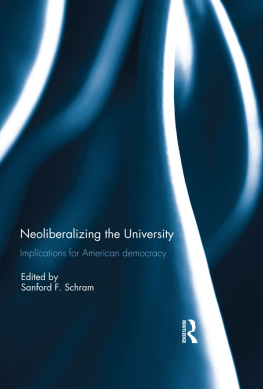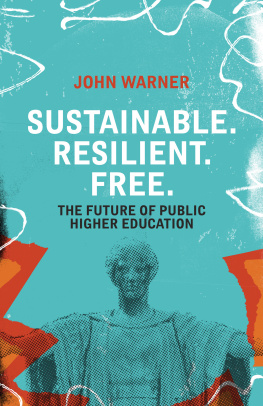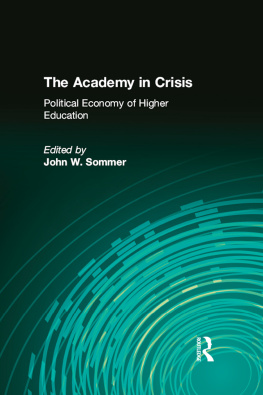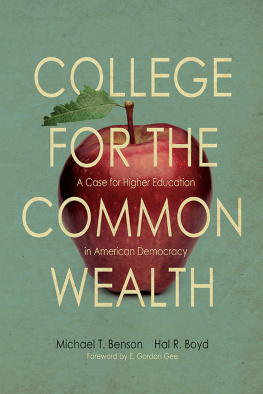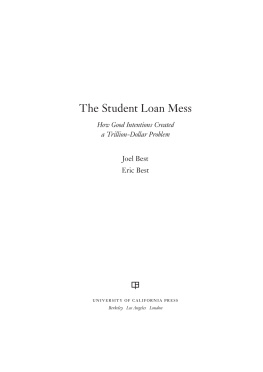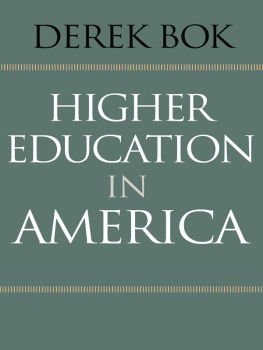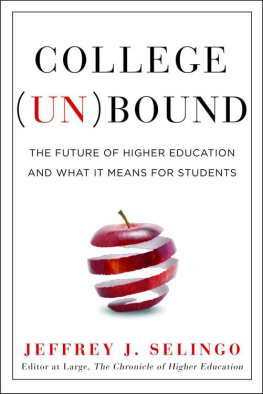Neoliberalizing the University
This collection brings together essays to address the crisis of higher education today, focusing on its neoliberalization. Higher education has been under assault for several decades as neoliberalisms preference for market-based reforms sweeps across the US political economy. The recent push for neoliberalizing the academy comes at a time when it is ripe for change, especially as it continues to confront growing financial pressure, particularly in the public sector. The resulting cutbacks in public funding, especially to state universities, led to a variety of debilitating changes: increases in tuition, growing student debt, more students combining working and schooling, declining graduation rates for minorities and low-income students, increased reliance on adjuncts and temporary faculty, and most recently growing interest in mass processing of students via online instruction. While many serious questions arise once we begin to examine what is happening in higher education today, one particularly critical question concerns the implications of these changes on the relationship of education to as yet still unrealized democratic ideals. The 12 essays collected in this volume create important resources for students, faculty, citizens, and policymakers who want to find ways to address contemporary threats to the higher education-democracy connection. This book was originally published as a special issue of New Political Science.
Sanford F. Schram is a Professor of Political Science and Faculty Associate at the Roosevelt House Public Policy Institute at Hunter College, City University of New York, New York, NY, USA. His latest book is The Return to Ordinary Capitalism: Neoliberalism, Precarity, Occupy (2015). He is the 2012 recipient of the Charles McCoy Career Achievement Award from the Caucus for a New Political Science.
Neoliberalizing the University
Implications for American democracy
Edited by
Sanford F. Schram
First published 2016
by Routledge
2 Park Square, Milton Park, Abingdon, Oxon, OX14 4RN, UK
and by Routledge
711 Third Avenue, New York, NY 10017, USA
Routledge is an imprint of the Taylor & Francis Group, an informa business
2016 CAUCUS FOR A NEW POLITICAL SCIENCE
All rights reserved. No part of this book may be reprinted or reproduced or utilised in any form or by any electronic, mechanical, or other means, now known or hereafter invented, including photocopying and recording, or in any information storage or retrieval system, without permission in writing from the publishers.
Trademark notice: Product or corporate names may be trademarks or registered trademarks, and are used only for identification and explanation without intent to infringe.
British Library Cataloguing in Publication Data
A catalogue record for this book is available from the British Library
ISBN 13: 978-1-138-19474-8
Typeset in Book Antiqua
by diacriTech, Chennai
Publishers Note
The publisher accepts responsibility for any inconsistencies that may have arisen during the conversion of this book from journal articles to book chapters, namely the possible inclusion of journal terminology.
Disclaimer
Every effort has been made to contact copyright holders for their permission to reprint material in this book. The publishers would be grateful to hear from any copyright holder who is not here acknowledged and will undertake to rectify any errors or omissions in future editions of this book.
Contents
Sanford F. Schram
Clyde W. Barrow
Steven C. Ward
Tracy L.R. Lightcap
Jacob Segal
Joseph M. Schwartz
Vincent Tirelli
Seaton Patrick Tarrant and Leslie Paul Thiele
Clyde Wilcox, JoVita Wells, Georges Haddad and Judith K. Wilcox
Douglas A. Medina
Brian Caterino
George Ehrhardt
Romand Coles
The chapters in this book were originally published in New Political Science, volume 36, issue 4 (December 2014). When citing this material, please use the original page numbering for each article, as follows:
Sanford F. Schram
New Political Science, volume 36, issue 4 (December 2014) pp. 425437
Clyde W. Barrow
New Political Science, volume 36, issue 4 (December 2014) pp. 438458
Steven C. Ward
New Political Science, volume 36, issue 4 (December 2014) pp. 459473
Tracy L.R. Lightcap
New Political Science, volume 36, issue 4 (December 2014) pp. 474488
Jacob Segal
New Political Science, volume 36, issue 4 (December 2014) pp. 489503
Joseph M. Schwartz
New Political Science, volume 36, issue 4 (December 2014) pp. 504522
Vincent Tirelli
New Political Science, volume 36, issue 4 (December 2014) pp. 523537
Seaton Patrick Tarrant and Leslie Paul Thiele
New Political Science, volume 36, issue 4 (December 2014) pp. 538555
Clyde Wilcox, JoVita Wells, Georges Haddad and Judith K. Wilcox
New Political Science, volume 36, issue 4 (December 2014) pp. 556572
Douglas A. Medina
New Political Science, volume 36, issue 4 (December 2014) pp. 573589
Brian Caterino
New Political Science, volume 36, issue 4 (December 2014) pp. 590606
George Ehrhardt
New Political Science, volume 36, issue 4 (December 2014) pp. 607621
Romand Coles
New Political Science, volume 36, issue 4 (December 2014) pp. 622639
For any permission-related enquiries please visit:
http://www.tandfonline.com/page/help/permissions
Clyde W. Barrow is a Professor of Political Science at the University of Texas, Rio Grande Valley, TX, USA. His publications include Universities and the Capitalist State (1990), More Than a Historian: The Political and Economic Thought of Charles A. Beard (2000), and Globalisation, Trade Liberalisation, and Higher Education in North America (2003). He has also published numerous articles on state theory and higher education policy.
Brian Caterino is an Independent Scholar who works in public media in Rochester, NY, USA. He holds an MA and a PhD in Political Science from the University of Toronto, Toronto, ON, Canada, and is the co-editor (with Sanford F. Schram) of Making Political Science Matter (2006), as well as a contributor in Perestroika: The Raucous Revolt in Political Science (2005). He has published a number of articles and reviews in a number of journals on interpretive methods and critical theory.
Romand Coles is a Professor at the Institute for Social Justice, Australian Catholic University, North Sydney, Australia. He has written many books, including Beyond Gated Politics: Reflections for the Possibility of Democracy (2005), Christianity, Democracy, and the Radical Ordinary: Conversations between a Christian and a Radical Democrat (2007) with Stanley Hauerwas, and Visionary Pragmatism: Radical and Ecological Democracy (2016).
George Ehrhardt is an Associate Professor of Government at Appalachian State University, Boone, NC, USA, specializing in Asian politics and research methodology, as well as being active in the conservative movement.
Georges Haddad attended the American University of Beirut, Beirut, Lebanon. He is currently a tenured Professor of Physiology at Howard University School of Medicine, Washington, DC, USA. He is nationally and internationally known for his work on the effects of alcohol on cardiomyocytes and excitationcontraction coupling. He is highly skilled in single-cell patch-clamp recordings and intracellular calcium determinations. He has been recognized for his outstanding mentoring of PhD students at Howard University.

